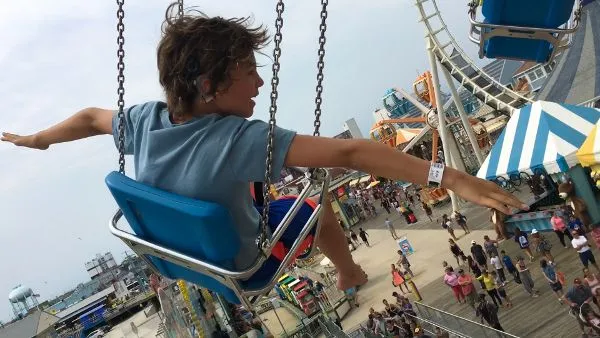Eye For Film >> Movies >> Moonlight Sonata: Deafness In Three Movements (2019) Film Review
Moonlight Sonata: Deafness In Three Movements
Reviewed by: Jennie Kermode

Stories told about deafness for general audiences tend to be about one of two things: the tragedy of losing hearing or the miracle of (re)gaining it. Occasionally they set out to explore the otherness of the Deaf community. What they very rarely do is to bring Deaf and hearing people together to explore different forms of communication, the cultural meaning of these languages and the fact that some experiences of deafness are positive. This film is different.
As the title suggests, it is in part a reflection of Beethoven's Moonlight Sonata, commonly framed within a tragic narrative about a man in the process of losing what he most valued. Documentarian Irene Taylor Brodsky positions it differently, looking at it as a means through which the composer stored sound so that he could continue to enjoy it through reading or feeling the vibrations of the instrument beneath his fingers, reflecting on the silence that followed as something that allowed him the mental space to develop his most complex and challenging works. It'a a very personal piece to her because her son Jonas has fallen in love with it. The film follows his efforts to master it and his own relationship with deafness.
Brodsky has touched on this subject several times before, most notably in 2007's Hear And Now, which documented her parents' experience of getting cochlear implants. Jonas has one too, but got it wen he was very young, so hasn't had their difficulty adjusting to life in the hearing world. The film compares these different journeys as Brodsky's parents deal with age-related issues and Jonas explores two different ways of living, sometimes choosing to be with and sometimes without his hearing aid.
The deafness in Brodsky's family is inherited but sometimes skips a generation. She can hear, which makes her an outsider in this situation, and her own investment in trying to understand and connect provides a conduit for hearing members of the audience to do so. The detailed observations she makes are the kind of things that it would be much harder to pick up on in a less intimate situation. Her parents share their thoughts on how different prospects are for hearing impaired children today from when they were growing up. In one scene, her father turns off his hearing aid to mute the shouts of a demanding child, and many viewers will feel a twinge of envy.
Much of the film's charm comes from its naturalness. Jonas is not a polished interview subject or an ambassador for those in his situation. He's a child - 11 at the time the film was completed - and he's often distracted, emotional or going off on tangents. He's lazy about learning to sign or facing towards his lip-reading grandparents just as he's lazy about piano practice, but underneath that he's full of goodwill and real determination. Multilingualism doesn't come easily but there's a sense that all these different forms of self expression are giving him insights that those around him lack.
There's a great deal to enjoy here whether or not you too have a personal connection with deafness. The film is refreshing in its willingness to countenance multiple viewpoints and look at what's right for individuals rather than taking sides in one of the more heated debates within the Deaf community. Its power lies in its humanity and it's sufficiently compelling that you'll barely notice how much you're learning along the way.
Reviewed on: 10 Sep 2019















